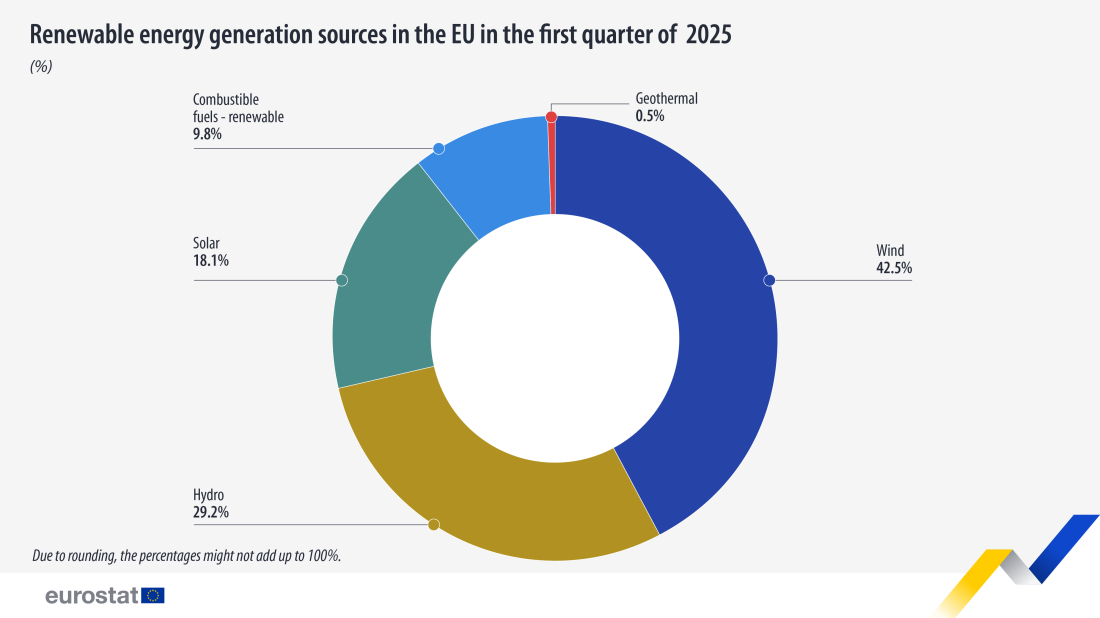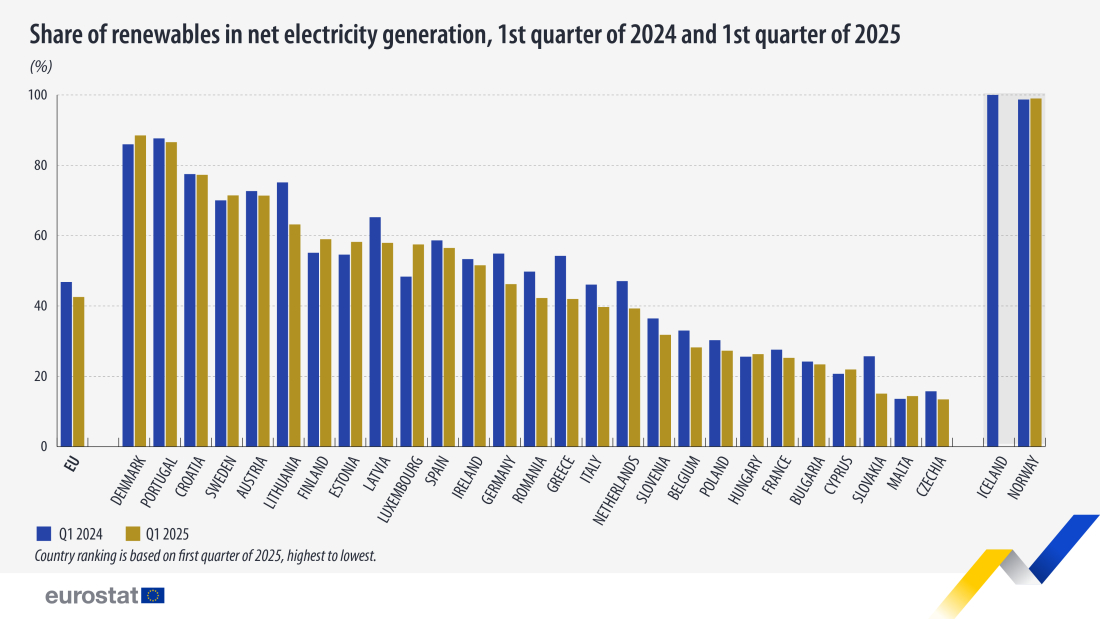Obama says aliens are 'real' but chance of contact with them unlikely
Former U.S. President Barack Obama said aliens are “real,” but emphasised that he never encountered any indication of extraterrestrial contact whi...
In 19 EU countries, the share of renewable energy sources in net electricity generation decreased in the first quarter of 2025 compared with the first quarter of 2024. The largest drops were recorded in Greece (-12.4%), Lithuania (-12.0%) and Slovakia (-10.6%).
According to the Eurostat, 42.5% of net electricity generated in the EU came from renewable energy sources. Compared with the first quarter of 2024, this represents a 4.3% decrease (from 46.8%).
Most of the electricity generated from renewable sources in the first quarter of 2025 came from wind (42.5%), hydro (29.2%) and solar (18.1%), followed by combustible renewable fuels (9.8%) and geothermal energy (0.5%).

The significant increase in electricity generation from solar (from 40.9 TWh in the first quarter 2024 to 55 TWh in the first quarter 2025) was not sufficient to compensate for the decrease in hydro and wind production (from 260.5 to 218.5 TWh over the same period).
Among EU countries, in the first quarter of 2025 Denmark had the highest share of renewables in net electricity generated with 88.5%, followed by Portugal (86.6%) and Croatia (77.3%). The lowest shares of renewables were recorded in Czechia (13.4%), Malta (14.4%) and Slovakia (15.1%).

The share of renewables in net electricity production should not be mistaken for the share of renewables in gross electricity consumption, which is the main indicator used to monitor the Renewable Energy Directive (RED). The methodologies used to calculate each of them differ. The former (used in this article) is only based on electricity generation, while the latter follows the methodology of the RED and divides electricity generation by electricity consumption.
Iran’s Supreme National Security Council Secretary Ali Larijani said the United States could evaluate its own interests separately from those of Israel in ongoing negotiations between Tehran and Washington.
U.S. Secretary of State Marco Rubio on Sunday (15 February) called it “troubling” a report by five European allies blaming Russia for killing late Kremlin critic Alexei Navalny using a toxin from poison dart frogs.
Cuba’s fuel crisis has turned into a waste crisis, with rubbish piling up on most street corners in Havana as many collection trucks lack enough petrol to operate.
Norway is holding a commanding lead in the medal standings with 12 golds and a total of 26, with Italy having an historic performance on home soil on the ninth day of the Milano-Cortina Winter Olympics on Sunday (15 February).
Iran is pursuing a nuclear agreement with the U.S. that delivers economic benefits for both sides, an Iranian diplomat was reported as saying on Sunday (15 February), days before a second round of talks between Tehran and Washington.
The administration of U.S. President Donald Trump on Thursday (12 February) announced the repeal of a scientific finding that greenhouse gas emissions endanger human health, and eliminated federal tailpipe emissions standards for cars and trucks.
Tropical Cyclone Gezani has killed at least 31 people and left four others missing after tearing through eastern Madagascar, the government said on Wednesday, with the island nation’s second-largest city bearing the brunt of the destruction.
Rivers and reservoirs across Spain and Portugal were on the verge of overflowing on Wednesday as a new weather front pounded the Iberian peninsula, compounding damage from last week's Storm Kristin.
Morocco has evacuated more than 100,000 people from four provinces after heavy rainfall triggered flash floods across several northern regions, the Interior Ministry said on Wednesday.
Greenland registered its warmest January on record, sharpening concerns over how fast-rising Arctic temperatures are reshaping core parts of the island’s economy.
You can download the AnewZ application from Play Store and the App Store.

What is your opinion on this topic?
Leave the first comment